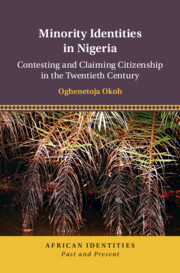
- Coming soon
- Publisher:
- Cambridge University Press
- Expected online publication date:
- July 2025
- Print publication year:
- 2025
- Online ISBN:
- 9781108764001
- Subjects:
- Area Studies, African Studies, History, African History

Ethnic majorities and minorities are produced over time by the same processes that define national borders and create national institutions. Minority Identities in Nigeria traces how western Niger Delta communities became political minorities first, through colonial administrative policies in the 1930s; and second, by embracing their minority status to make claims for resources and representation from the British government in the 1940s and 50s. This minority consciousness has deepened in the post-independence era, especially under the pressures of the crude oil economy. Blending discussion of local and regional politics in the Niger Delta with the wider literature on developmental colonialism, decolonization, and nationalism, Oghenetoja Okoh offers a detailed historical analysis of these communities. This study moves beyond a singular focus on the experience of crude oil extraction, exploring a longer history of state manipulation and exploitation in which minorities are construed as governable citizens.
‘Conceptually sophisticated, methodologically rigorous, and beautifully written, Minority Identities in Nigeria is a milestone in historical scholarship on Nigeria in particular, and the history of minority agitation in Africa, in general.’
Saheed Aderinto - author of Animality and Colonial Subjecthood in Africa
‘Oghenetoja Okoh has crafted a significant contribution to the study of Nigerian political history. In accessible prose and well-organized chapters, she explores the historical construction of majority and minority identities in Nigeria and how they became centered around ethnicity. Through an examination of Niger Delta communities, she shows how they competed for resources as ethnic subjects. She also demonstrates how colonial administrative reorganizations up to the decolonization period cemented the role that ethnicity would play in the very definition of Nigerian citizenship. This study is a must-read for anyone interested in understanding the roots of the contemporary Nigerian state and its relationship with communities of the Niger Delta.’
Judith A. Byfield - author of A Great Upheaval: Women and Nation in Post-War Nigeria
 Loading metrics...
Loading metrics...
* Views captured on Cambridge Core between #date#. This data will be updated every 24 hours.
Usage data cannot currently be displayed.